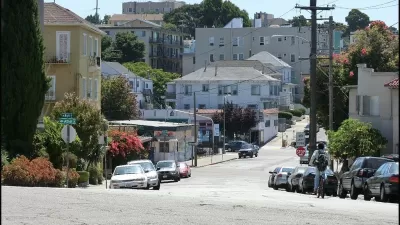As an educator who also enjoys practice, I periodically weigh up where my efforts are best spent. Is it making a difference via educating students in the classroom, and through my research and writing, as they use this knowledge in their work in the distant future? Or can I make a difference more directly though practice now? It is hard to know which path is best and the path of teaching is a riskier choice. Truly exceptional teachers and scholars, however, can make an enormous impact.
As an educator who also enjoys practice, I periodically weigh up where my efforts are best spent. Is it making a difference via educating students in the classroom, and through my research and writing, as they use this knowledge in their work in the distant future? Or can I make a difference more directly though practice now? It is hard to know which path is best and the path of teaching is a riskier choice. Truly exceptional teachers and scholars, however, can make an enormous impact.
Peter Marris, who taught me at UCLA, was one such educator. He was not initially a teacher. His early work--for almost two decades--was with British social researchers Peter Willmott and Michael Young. As the third person hired in the famous Institute for Community Studies he studied issues of social change in Britain, the U.S., and Africa, aiming to influence policies and hence people's lives. Then and later he wrote nine books including a novel about planning along with a number of significant articles. While he was most clearly a sociologist, several of his books are classics in the planning field. These included work exploring the limits, potential, and transformations of community action and anti-poverty programs: Dilemmas of Social Reform (1967, with Martin Rein), and Meaning and Action (1982, Revised 1987).
Much of his work reflected the insight that attachments are at the base of meaning, that uncertainty undermines meaning, and that the control of uncertainty is as much a form of power as the control of resources. I cried the first time I read Peter's Loss and Change (1974), a book that offered new insights into the ability to deal with drastic change--be it personal loss, class mobility, or urban renewal. An interest in how people learn to cope with an uncertain and changing world is also evident in The Politics of Uncertainty (1996), a book that explicitly links the personal and the global.
Peter's experience as a researcher-as an interviewer, listener, and theorist-provided the basis for his teaching approach. I remember my first class with Peter as a masters student. I entered with a strong concern about injustice and a desire to help people materially. Peter, however, started this introductory social policy class with a series of questions about what made life meaningful or worth living and how planning could support that. It is hard to overstate how challenging, difficult, and transformative these questions were to the class. I think that Peter's gentleness and sensitivity gave him a unique capacity to penetrate our armor of certainty. He managed to utterly transform my way of seeing planning and the world.
Peter loved boats and even I spent time on a boat with Peter. While he was shy, he also had a marvelous sense of humor. I particularly remember the time he invited the students in his "ideology and power" seminar to his home for an end of semester dinner. At our final meetings to discuss our draft papers each student was allocated a dish to bring to balance out the meal. Each student (we found when we arrived) was told to bring dessert.
Several years ago I assembled a nomination for an award for Peter. Letter after letter described Peter Marris's outstanding intellectual contributions, remarkable mentorship of students, and compelling presence in the classroom. In his classes he fostered an intensive, intimate engagement with the most important issues of life facing people in urban areas. He managed to make these important contributions while also demonstrating a deep humanity. Each letter commented on Peter's kindness, compassion, patience, wisdom, decency, tact, and gentle humility. He is truly a model for an exceptional academic life.
I have had a few other great teachers--one was feisty and daring, another attentive and yet challenging, another strategic and analytical, and a final one evoked the character of space in another culture so strongly that I can still inhabit it in my mind 25 years later. Of course, great teachers are not great for every student--there needs to be a point of connection and students need to be open to a transformation at that time. Peter Marris was, however, one of the best of these great teachers and scholars, transforming the lives of students and readers and providing an extraordinary model for the work of a planner in the academic world and outside.
As a planner, I have roughed up a schedule of blogs for the rest of the year, aiming to deal with topical issues at appropriate times. My September blog was to be about great teachers, focusing on Peter Marris as the exemplar of a transformative educator. Some things don't work as planned and Peter died in June. Much of this blog is based on a nomination letter I had shared with Peter. However, it would have been nice share these thoughts with him again.
An article demonstrating Peter Marris clear and innovative thinking is published in the Chronicle of Higher Education.

Maui's Vacation Rental Debate Turns Ugly
Verbal attacks, misinformation campaigns and fistfights plague a high-stakes debate to convert thousands of vacation rentals into long-term housing.

Planetizen Federal Action Tracker
A weekly monitor of how Trump’s orders and actions are impacting planners and planning in America.

San Francisco Suspends Traffic Calming Amidst Record Deaths
Citing “a challenging fiscal landscape,” the city will cease the program on the heels of 42 traffic deaths, including 24 pedestrians.

Defunct Pittsburgh Power Plant to Become Residential Tower
A decommissioned steam heat plant will be redeveloped into almost 100 affordable housing units.

Trump Prompts Restructuring of Transportation Research Board in “Unprecedented Overreach”
The TRB has eliminated more than half of its committees including those focused on climate, equity, and cities.

Amtrak Rolls Out New Orleans to Alabama “Mardi Gras” Train
The new service will operate morning and evening departures between Mobile and New Orleans.
Urban Design for Planners 1: Software Tools
This six-course series explores essential urban design concepts using open source software and equips planners with the tools they need to participate fully in the urban design process.
Planning for Universal Design
Learn the tools for implementing Universal Design in planning regulations.
Heyer Gruel & Associates PA
JM Goldson LLC
Custer County Colorado
City of Camden Redevelopment Agency
City of Astoria
Transportation Research & Education Center (TREC) at Portland State University
Jefferson Parish Government
Camden Redevelopment Agency
City of Claremont






























